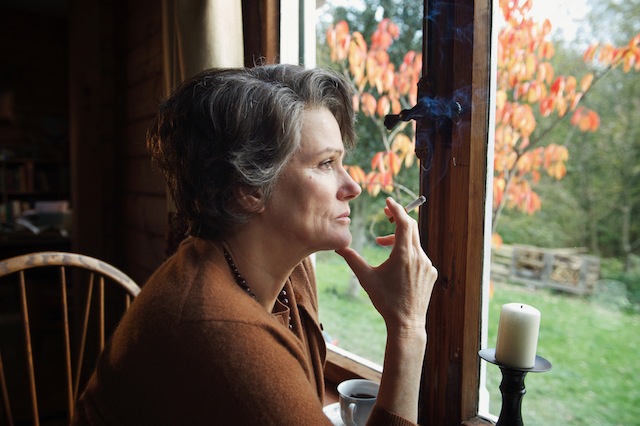CHICAGO – In anticipation of the scariest week of the year, HollywoodChicago.com launches its 2024 Movie Gifts series, which will suggest DVDs and collections for holiday giving.
Film Review: ‘Hannah Arendt’ Demonstrates Banality of the Biopic
CHICAGO – “Hannah Arendt” comes to American cinemas packaged in the sort of prestige that elicits admiration rather than anticipation. Though Margarethe von Trotta is widely regarded as the leading female filmmaker in Germany, it’s doubtful that any audiences outside of her native country are all that familiar with her work. Her new film, “Hannah Arendt,” is so undistinguished that it’s hard to believe that it was made by a director often mentioned in the same breath as Fassbinder and Herzog.
 Rating: 2.5/5.0 |
Von Trotta’s long-standing interest in feminist icons has led her to make a series of historical (yet often fictionalized) biopics, many of which provided showcases for acclaimed actress Barbara Sukowa (she won Best Actress at Cannes for playing the titular role in Von Trotta’s 1996 effort, “Rosa Luxemburg”). Since none of these previous films were viewed by me, I was initially taken aback by Sukowa’s portrayal of Arendt, which hardly looks and sounds like the real woman. She has the hairdo of Grace Zabriskie, the voice of Madeline Kahn, and in wide angles, threatens to take the form of Estelle Getty.
 Read Matt Fagerholm’s full review of “Hannah Arendt” in our reviews section. Read Matt Fagerholm’s full review of “Hannah Arendt” in our reviews section. |
Yet as these distractions dissipate, it becomes immensely clear that Sukowa is an ideal medium to channel the feistiness, disarming warmth and uncompromising conviction of Arendt, the German-American political theorist who gained notoriety for her 1961 “New Yorker” report and subsequent novel on the trial of Nazi colonel Adolf Eichmann. Sukowa used the now-infamous phrase, “the banality of evil,” to describe Eichmann’s psyche, which she argued was representative of the thoughtlessness that leads ordinary people to commit heinous acts. Her criticism of Jewish leaders, such as M.C. Rumkowski, drew the ire of many social organizations offended by the very notion that any Jews could’ve played a role in their own demise. Like so many biopics hinging on immensely provocative questions regarding the ambiguity of morality, Von Trotta’s film is blandly sure-footed in its design, bathing Arendt in approval while reducing her naysayers to villains in a Robin Williams movie. It’s disappointing to see a film preach the importance of thinking for oneself while allowing its narrative structure to more or less remain on autopilot. Sukowa’s performance is better than the surrounding film, which catches fire only during her climactic defense of the Eichmann coverage, eliciting applause from everyone except her mustache-twirling foes.
 Continue reading for Matt Fagerholm’s full “Hannah Arendt” review.
Continue reading for Matt Fagerholm’s full “Hannah Arendt” review.
Barbara Sukowa stars in Margarethe von Trotta’s Hannah Arendt.
Photo credit: Véronique Kolber/Zeitgeist Films


